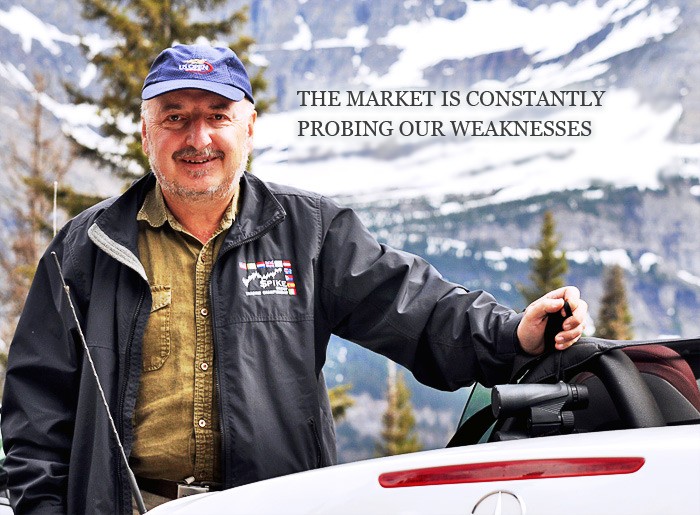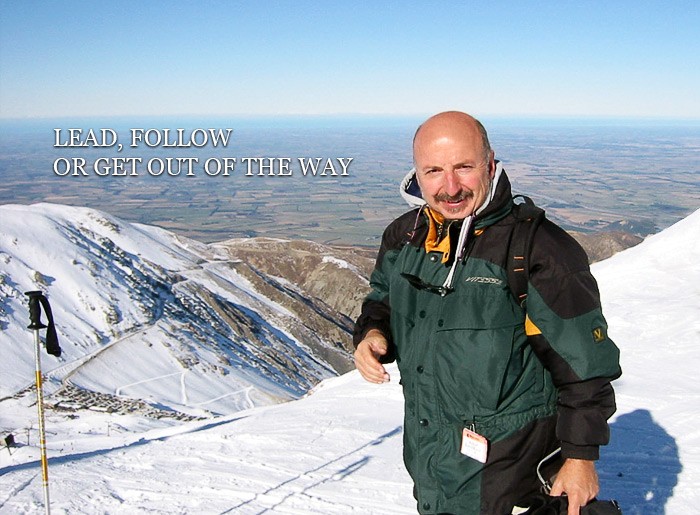With the suggestive quote below, Alexander Elder begins his masterpiece, Trading for a Living. Elder, who studied psychiatry in the former Soviet Union, enlisted in a ship from which he fled risking his life and after being chased by his own companions arrived in New York in 1974, with 25 dollars in his pocket and no one to ask for help. He currently presides over Financial Trading Inc., a company mainly dedicated to providing training and is widely known for its contribution to the psychology of trading.
“You can be free. You can live and work anywhere in the world. You can be independent from routine and not answer to anybody.”
In this article, we will review the main concepts of this work, which deals with a fundamental aspect, forgotten by many, which is the control of emotions, for many authors this constitutes more than 50% of our success as traders, to which we would add in second place the monetary management (money management) and in the last place we would have our trading system that contributes in a ridiculous 5%-10% to our result curve. If we devote a few minutes to these percentages we will realize that our scale of values was the opposite when we began to take an interest in the stock market.
Success in trading is achieved by understanding that control of emotions is the fundamental part of our operation, the lack of this control is what separates 95% of participants from their money. The trading industry knows this and carries out continuous advertising campaigns to attract new customers by promising a Holy Grail that never arrives and will never arrive if we look for it outside ourselves. A constant source of new entrants is needed to feed brokers, dealers, and the small percentage of traders who consistently make money.
The Amateur trader is attracted to the market by a powerful advertising machine that tries to convince him that this is a zero-sum game, all you have to do is be smarter than the rest of the participants to win large sums of money. The reality is quite different, it is not a game of Zero Sum, but a game of Negative Sum, the trader must fight, not only against the other participants but against the commissions and the slippage, that globally constitute huge amounts of money that is constantly drained by brokers and dealers.
They also convey to us the idea that sliding or slippage costs are necessary, they are the price we must pay to enter and exit the market, is the cost of liquidity. The reality is that every operation we do will be like a bite to our income statement so we must avoid markets with little liquidity and order it for the best, as well as operate with a methodology that performs an excessive number of operations.

Year after year, a large number of people approach the financial markets in order to achieve financial independence, most people with a low profile of risk aversion. Without a doubt, the first attraction that one has towards trading comes for money, however that is not the goal, in the words of Elder: “The goal is not making money, paradoxically, but to trade well”. We must worry about doing good operations and forget about the money that is at stake, only in this way can we make money consistently. By the time we let emotions take over, we’ll have lost the game.
Novice traders and those who want to enter this field often ask how much money can be earned annually, trading in the market, looking for a figure that serves as a reference, a magic figure on which to base the decision to leave a monotonous job and achieve financial independence. This is not, however, the right question, what we should ask ourselves is: How much money am I going to lose until I learn to trade and create a long-term winning trading strategy?
Planning and discipline play a crucial role, we must know at all times what our plan is and follow it to the letter, for this purpose it is advisable to take all the operations in a spreadsheet and write a diary with our operations, in the words of Elder:
“Plan your trade and trade your plan.”
This is a phrase that contains much more content than we see at first glance and that most new traders skip. In our trading journal, we must reflect the trades in as much detail as possible, which will separate us from the casino player and lead us to structure our mind and continuous improvement of our trading system. It is of course easier to write down the days when we have earned money and feel euphoric, we must be disciplined and write down every day we have operated, whether positive or negative. We must have a long-term mentality in our operation, if we are to start operating in the market we must mark a long period of survival in the market.
According to an old adage from Wall Street, “Bears make money, Bulls make money, and pigs are slaughtered”. Having added the sheep to this group, we can already classify all market participants. The price that every action, future, commodities, etc, shows us at every moment is nothing more than a psychological effect of all traders participating in a market. Every day a battle is established between Bulls and Bears. The bulls are those who think that the market will rise, the bears, on the contrary, think that it will go down, the pigs are dragged by greed and have no clear stance to take, while sheep are moved by fear of taking positions in the market and are highly influenced by other participants, analysts, and gurus. Pigs and sheep will always lose money.
According to Alexander Elder the market is a huge mass of traders, in which everyone tries to take the money from others by being smarter. In addition to this fight, traders have to face commissions and slippage, so by opening a position we are already losing money. Independent traders trade for both irrational and rational reasons, the rational reasons are the search for a net return to our capital, while the irrational ones are gambling and the search for strong emotions, We must fight to control our irrational side, which will drive us to operate excessively.
“Remember your goal is to trade well, not to trade often.”
Faced with all these obstacles the trader who works for a firm has the great psychological advantage of not risking his money, besides the discipline is imposed on him by his superiors, but respect can be left without work. Another proof that trading is pure psychology is in the numerous examples of traders who have left their companies to devote themselves independently and due to greed, fear, panic, and euphoria, Their performance has been lower than that obtained as salaried traders.
We can’t control the market, the only thing we can control is our emotions when we open up a position. Being in the market completely changes us and we stop being guided by our system and start to be guided by the movement of the mass. Mass psychology has a great application in the world of financial markets. From the tulip-mania, the South Sea Company to the technology bubble, these phenomena are explained by greed and fear of the masses.
There are two books on mass psychology that are a necessary reference for the explanation of this type of phenomenon of collective madness, Charles Mackay with his work, “Extraordinary Popular Delusions and the Madness of Crowds” and the book by the French philosopher Gustav LeBon “The Crowd”. According to mass psychology, people change completely by getting into the crowd, we are more gullible, more anxious, we strive to look for the leader and we react to emotions instead of reasoning our decisions. Mass behavior will always be more primitive than individual behavior. In the words of Charles Mackay: ‘Men go mad in crowds and they come back to their senses, slowly, and one by one, reflect on this phrase as you think about what happened during the recent technology bubble.

Like the allegory of the sirens’ songs, which captivated the sailors with a song so beautiful that it forced them to jump into the water where they died drowning, In the market, there are also siren songs that will make us follow the mass in our investment decisions. To avoid certain death the sailors tied themselves to the ship’s mast and applied wax to their ears. If on the market we hear siren songs, let us stick to our trading system and our money management rules and thus avoid indications coming from abroad and focus on our way of trading, although this is easier said than done, We’ll get him on discipline.
We must be skeptical of all information coming from outside. As we begin to operate our first objective will be to preserve capital and the second its increase. This order of priorities is reversed in most cases and we skip the first phase, when we start in the markets greed and fear dominate our behavior. If we take as a reference a daily bar chart, we could state that the opening price is marked by amateurs and the closing price by professionals. In markets like the American, it is recommended to avoid the first hour of negotiation since false movements abound and are considered as the time of the novices. Statistical studies show that the best results are obtained by avoiding this first hour of negotiation.
The trader’s work is based on looking for trends and areas of congestion, being the second much more abundant than the first, if we observe a chart the task seems easy. Experts and gurus show us graphs and tell us where we should have entered and left the market as if this was a simple task. The problem is that your broker will not let you place the order in the middle of a chart, it will always require you to do it in the closest part to the right margin, in the most current part. This brings us to a world in which we must make our decisions based on probabilities in an atmosphere of uncertainty. Most people do not accept uncertainty, as they have a strong emotional need to be right in their decisions, keeping the losing positions in the hope that the market will turn around and give us a reason and selling the winning positions prematurely to feed our ego. Wanting to be right in the market can be very expensive.
Trading is a very exciting activity and this leads novice traders to feel euphoric, for an amateur trader being in the market is like a ticket to the cinema or a football game, However, trading is a much more expensive entertainment than film or football and no one can feel euphoria in the market and earn money at the same time, “Emotional trading is the enemy of success”. We should not feel emotions about the results of our operations. We must concentrate on doing good operations and improving our skills day by day and not on the money we are earning or losing.

If we seek financial independence as traders, we must consider trading as a profession. Just like a good doctor or a good lawyer, we must devote many years of preparation or perhaps think that we can practice law, or medicine with 3 or 4 magical systems and two courses on how to operate in the market. Another common mistake is to count the money we are earning or losing while we are in the market, a good professional in any other profession would never do it. The goal of the trader is to make good trades and the money must be in the background, if we make good trades the money will come without us realizing it. We can count the money when we have closed the position, at the time of registering it in our trading journal.
I hope that this brief review of Elder’s work will help you to know better the market and especially to know yourself better, the emotional component of the stock market operation is very important and we must dedicate time if we want to belong to the select club of 5%. Although the author considers money management fundamental, it is a book of psychology and this topic only gives two tips, the rule of 2% risk per position and a maximum 6% monthly loss.

